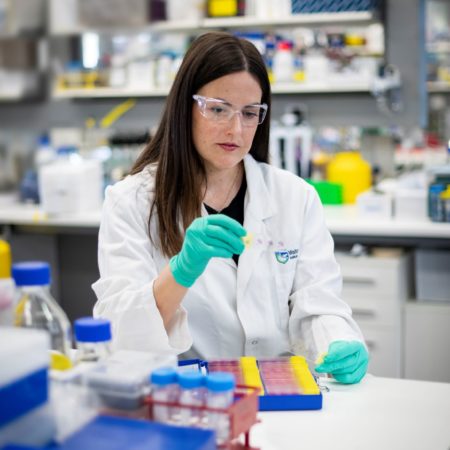For Dr Clare Weeden, research means everything. It means hope for the next generation of lung cancer patients.
What are some of the key findings, progress and discoveries you have made with your research to date – and how will this make a difference to patients with this disease?
Our research has previously focused on lung squamous cell carcinoma – the second most common subtype of lung cancer. Lung squamous cell carcinoma is often diagnosed too late, when the cancer is inoperable. Therefore, the ability to detect this cancer early would help more patients have life-saving surgery. We identified the cells that are likely to give rise to lung squamous cell carcinoma, known as basal stem cells, that are present in healthy airways. We uncovered evidence that these cells are the “seed” from which lung squamous carcinomas grow. The hope going forward is our discovery will allow for the earlier detection of aberrant basal stem cells and enable more patients to have curative surgery.
We have also investigated how to better treat lung squamous cell carcinomas with “targeted”, personalised medicine. We identified a ‘biomarker’ that would better categorise the patients who would respond to promising new anti-cancer drugs called FGFR (Fibroblast Growth Factor Receptor) inhibitors. We hope this work will allow for the right participants to be recruited into clinical trials to evaluate the efficacy of this new targeted therapy. Our recent work has also found that two BH3-mimetics and one FGFR inhibitor were able to block cancer cell survival so successfully in pre-clinical models that tumours not only stopped growing, they began to shrink away. The next step in our research is working to develop new drugs that can block these molecules safely and effectively in patients.
What do you hope to achieve with this research project?
My research project investigates lung cancer metastasis. Over 70% of lung cancer patients present with cancers that have spread from the ‘primary’ lung cancer to other parts of the body and this renders their cancer inoperable. Such patients rely on chemotherapy, radiotherapy and more recently immunotherapy to slow the growth of their tumours, yet this treatment is rarely curative. There is a desperate need to design new treatments that target metastases, which requires an understanding of the unique features of these cancer cells and their microenvironment. I am profiling the cancer cells and immune cells from ‘primary’ and metastatic sites within lung cancer patients to identify novel targets for treatment. Our work relies on the generosity of lung cancer patients, and collaboration between clinicians and basic scientists. We hope this project will go on to improve treatment options for the majority of lung cancer patients who present with inoperable tumours.
Dr. Clare Weeden hopes that in the future, lung cancer will become a manageable disease.
How important was the funding from Lung Foundation Australia to your work?
The Deep Manchanda Early Career Fellowship is crucial in supporting me to continue my work in lung cancer and lung diseases. This funding allows me to ask challenging research questions and perform state-of-the-art experiments to answer them. Funding opportunities for young researchers can be scarce. Having dedicated funding support for lung diseases attracts more researchers to tackle these projects, and with more research comes more discoveries that have the potential to improve the health of patients living with lung diseases.
Do you have a message for Lung Foundation Australia’s supporters?
Despite being the leading cause of cancer death, lung cancer research currently receives only 5% of cancer research funding in Australia. Your support evens this gap, and funds research that has real-world impact on the lives of patients. Thank you for supporting our research into lung cancer and lung disease, it truly makes our work possible.
Was this page helpful?
Good job! Please give your positive feedback
How could we improve this post? Please Help us.
